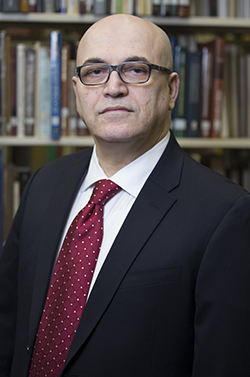Mehdi Semati
Professor
Journalism
Specialties
- International communication and global media
- Cultural studies of news media and journalism
- Iranian media and culture
- Race and ethnicity
- Media studies
Latest Publications
-
Semati, M. & Moosavitabar, E. (2024). The state and streaming services in Iran: Legacy and disruptive media. In R. Brookey, J. Phillips, & T. Pollard (Eds.), Triaging the Streaming Wars (pp. 36-55). Routledge.
-
Semati, M., & Behroozi, N. (2023). Gando and the (geo)political imagination on Iranian television. In C. Salamandra & N. Halabi (Eds.), The Politics in and of Middle Eastern Television (pp. 124-141). Routledge.
-
Semati, M., & Zambon, K. (Eds.). (2023). The Global Politics of Celebrity. Routledge.
-
Semati, M. (2023). Media technologies and politics in Iran. In J. Khalil, G. Khiabany, T. Guaaybess, & B. Yesil (Eds.), The Handbook of Media and Culture in the Middle East (pp. 382-395). Wiley.
-
Semati, M., Cassidy, W. P., & Khanjani, M. (2021). Iran and the American media: Press coverage of the “Iran Deal” in context. London: Palgrave Macmillan.
-
Semati, M., & Zambon, K. (2021). The global politics of celebrity. Popular Communication, 19(3), 59-163.
-
Semati, M., & Behroozi, N. (2020). Paradoxes of gender, technology and the pandemic in the Iranian music industry. Popular Music and Society, 44(1), 1-13.
-
Semati, M. (2020). Politics of Culture and Communication and the Islamic Republic of Iran. Middle East Journal of Culture and Communication, 13(1), 1-6.
-
Semati, M., Szpunar, P., & Brookey, R. (Eds.). (2018). ISIS Beyond the Spectacle: Communication Media, Networked Publics, and Terrorism. London: Routledge.
-
Semati, M. (2018). Exilic, Diasporic, and Ethnic Media: Hamid Naficy's Oeuvre from an International Communication Perspective. Iran Namag: A Bilingual Quarterly of Iranian Studies, 3(3), XXVIII-XLVII.
-
Semati, M., & Szpunar, M. P. (2018). ISIS beyond the spectacle: communication media, networked publics, terrorism. Critical Studies in Media Communication, 35(1), 1-7.
-
Semati, M. (2017). Sounds like Iran: On popular music of Iran. Popular Communication, 15(3), 155-162.
-
Semati, M. (2017). Iran, media and the discourse of human rights. In H. Tumber & S. Waisbord (Eds.), The Routledge Companion to Media and Human Rights (pp. 158-168). London: Routledge.
-
Semati, M., Faraji, M., & Hamidi, Y. (2016). Elite discourse on technology in Iran: Negotiating technology, modernity and Islam. Sociology of Islam, 4(4), 323-344.
-
Semati, M., & Brookey, R. (2014). Not for Neda: Digital media, (citizen) journalism, and the invention of a post-feminist martyr. Communication, Culture and Critique, 7(2), 137-153.
-
Semati, M. (2012). The geopolitics of Parazit, the Iranian televisual sphere, and the global infrastructure of political humor. Popular Communication, 10(1-2), 119-130.
-
Semati, M. (2011). Communication, culture and the Essentialized Islam. Communication Studies, 62(1), 113-126.
-
Semati, M. (2010). Islamophobia, culture and race in the age of Empire. Cultural Studies, 24(2), 256-275.
-
Semati, M. (Ed.). (2008). Media, Culture, and Society in Iran: Living with Globalization and the Islamic State. London: Routledge.
-
Semati, M. (2007). Media, the State, and the Pro-democracy Movement in Iran. In I. A. Blankson & P. D. Murphy (Eds.), Globalization and Media Transformation in New and Emerging Democracies (pp. 143-160). Albany, NY: SUNY Press.
-
Semati, M. (Ed.). (2004). New Frontiers in International Communication Theory. Lanham, MD: Rowman and Littlefield.
-
Chitty, N., Rush, R., & Semati, M. (Eds.). (2003). Studies in Terrorism: Media Scholarship and the Enigma of Terror. Penang, Malaysia: Southbound.
Contact Us
Department of Communication
Watson Hall 210
DeKalb, IL 60115
815-753-1563
815-753-7109 (Fax)
David Gunkel, Ph.D.
Department Chair
dgunkel@niu.edu
Ferald Bryan, Ph.D.
Director of Undergraduate Studies
Watson Hall 216
fbryan@niu.edu
